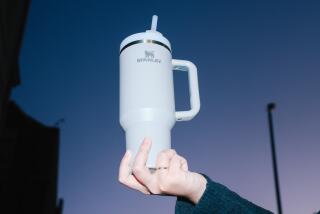Alfred Moen; Inventor Created Single-Handle Sink Faucet
Alfred M. Moen, who was inspired to build a better faucet after nearly burning his hands trying to wash them, died Tuesday at his home in Destin, Fla. He was 86.
Moen invented a single-handle faucet, which mixes hot and cold water before it exits the fixture. It transformed the American home and became the basis for Moen Inc., one of the world’s largest manufacturers of kitchen and bath plumbing fixtures.
Moen’s story began in 1937 when he was a college student working evenings in a garage to pay his tuition at the University of Washington. At the end of his shift one night, he went to wash up at the sink, which had a conventional two-handle faucet.
When he turned on the spigot, scalding water burst forth, making young Moen jump back in alarm. The incident did more than scare him, however. Moen couldn’t put the mishap out of his mind.
“It got me thinking,” he said, “that you ought to be able to get what you wanted out of a faucet.”
What he wanted was a way to control water volume and temperature at the same time. Since everybody washes their hands, he thought, solving this problem might have broad appeal. It began to consume Moen, who was a mechanical engineering major.
After several sessions at the drawing board, he arrived at what he believed was the answer: a faucet with a single handle that would mix water in the spigot before releasing it at the desired temperature.
Calling his creation a single-handle mixing faucet, Moen borrowed money to build models and pitched his design to plumbing manufacturers. It elicited a less than gushy response at first, with at least one major manufacturer telling him that his design had serious flaws.
Then World War II broke out, making brass and other necessary materials scarce as the nation geared up for combat. Moen went to work as a tool designer in a Seattle shipyard and then for Boeing Aircraft before being drafted into the Navy. But he never abandoned his vision for a perfect faucet.
It was not until 1947, a decade after he came up with the idea, that he found a willing manufacturer. That year, Ravenna Metal Products in Seattle sold 250 of Moen’s faucets to a San Francisco supplier, which retailed them for about $12 each. Soon Ravenna was producing 5,000 of the faucets a year to meet growing demand.
“The price was right, and it was easy to use,” Bob Miodonski, editorial director of the trade publication Contractor Magazine, said of the faucet’s popularity.
By 1950, Moen’s one-handled wonder was becoming the sink fixture of choice.
In 1959, Fortune magazine named Moen’s single-handle faucet one of the top 100 best-designed mass-produced products, along with Henry Ford’s Model-T and Benjamin Franklin’s stove.
Moen’s invention transformed his industry to the point where today more than 70% of kitchen faucets sold in the United States are the one-handle variety.
Moen never held an ownership stake in the company that bears his name, preferring instead a behind-the-scenes role. He ran Moen Inc.’s research and development division until his retirement in 1982 and held more than 75 patents.
His replaceable cartridge eliminated washers, drips and leaks. His pressure-balancing valve prevented shower shock, the rude surge of cold water caused when someone flushed a toilet or operated the dishwasher while another person was in the shower. He also invented the screen aerator, which prevented sediment buildup, and the swivel spray, which allowed the user to change the force of the water flow.
In his spare time, Moen skated, once placing second in men’s figure roller skating in the Washington state championships. He learned to fly in a float-plane before mastering more conventional aircraft.
Despite his varied talents, he listed only one occupation on his business card: “Inventor.”
“Al Moen was a giant in the plumbing industry,” said Bruce Carbonari, chairman and chief executive of Moen Inc., now headquartered outside Cleveland. “The conveniences many of us enjoy in our homes today came from the ideas of this gentle, inventive man.”
Moen is survived by a daughter, Christine, of Destin, Fla.; a son, Eric, of North Ridgeville, Ohio; and several grandchildren and great-grandchildren.







